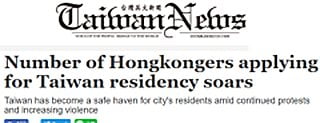At the behest of Beijing (we can be sure), Hong Kong’s Justice Dept is inviting the courts to concede that the ‘executive-led’ system overrides separation of powers. This would probably mean the government can use emergency laws to ban the wearing of masks (or curb the people’s rights in any way it wants) without oversight from the legislative or judicial branches.
After the ‘learned judges’ overruled the emergency-laws mask ban as unconstitutional, the government appealed, and they suspended the ruling for a week. They have now extended that for another week via an ‘interim interim temporary suspension order’. Beijing’s officials behind the scenes must smell spinelessness.
I declare the weekend open with the usual exciting links…
More on the District Council elections. A spirited account from Vivienne Chow, who wonders whether history will remember Carrie Lam for achieving the impossible: uniting Hongkongers. Atlantic buries the ‘silent majority’. SCMP does an in-depth look into why people voted against the government (hint: they hate it). For cartography freaks, a map of Hong Kong showing only the areas that voted pro-government – the rest under a rising sea of resistance. And some protest-art at the far heart-breaking end of the scale.
Alvin Cheung has a go at oh-so sophisticated US commentators who (pretty much) side with Beijing against the Hong Kong people.
Peter Humphrey, who knows what is talking about, discusses the televised forced confession of Simon Cheng.
Although the CCP seems to be successfully luring the Pope into kowtowing, Benedict Rogers is made of sterner stuff and explains Beijing’s threat to Hong Kong and the church, in particular.
The Diplomat on why Beijing’s approach to Hong Kong is so messed up (in case you didn’t know).
The CCP is censoring Chinese Americans on social media, surprise.
For history fans, a comparison of Elizabeth I and the Ming empress Xiaozhuang (their reigns were 10 years apart). Lizzie had much flashier clothes, for a start.
And Taiwan as a beacon for the Hong Kong protest movement…
Pro-democracy supporters see in Taiwan a fully developed Asian democracy that practices the democratic ideals and values for which they are fighting: freedom of speech, a free press, a vibrant civil society, and universal suffrage.
(Looking forward to a visit to Taichung in a few weeks.)


Spes Phthisica
[“a state of euphoria in patients with pulmonary tuberculosis”]
It can’t get worse than this, we think,
But it does. And for a time
While gas drifted and fires burnt
I could not rhyme.
Wheezing and cursing, fleeing and stumbling,
Some patients died each night:
Floated in the harbour, bled in the street,
Or “fell from a height”.
But at work, at home, in daily life,
What is one to do?
What is the point of repairing, planning,
Investing, or buying anything new?
“Today they are building in Oxford Street, the mortar
Pleasant to smell,
But now it seems futility, imbecility,
To be building shops when nobody can tell
What will happen next.” So the poet wrote
In 1939. We too may fear
That the ground will crack
Now, next month, or next year.
In the districts, early one Sunday morning
The people stood in line;
And on Monday, such relief and hope,
And daily life, so pleasant and benign.
The air is dry and the days are sunny
And the patients rise, euphoric, and cry,
“We are better now!” The doctors murmur,
“They have a chance. They might not die.”
– – – –
‘Spes’ (Latin): hope. ‘Phthisica’ (pronounced ‘tisica’) alludes to a wasting disease.
The quotation is from ‘Autumn Journal’ by Louis MacNeice.
On 1 July 1901, the Governor of Hong Kong made the “Outlawry Abolition Ordinance” which stated that no person shall be outlawed or waived in or in consequence of any civil proceeding…etc.
This does rather raise the question of the exact extent of the plenipotentiary powers being asserted by the Chief Executive, under the Emergency Regulations Ordinance for one and more generally.
Prior to another 1 July, in 1997, it was the Governor who was law-maker and after that, law-making passed to LegCo.
If the Chief Executive has plenipotentiary powers, why ask the Courts to give judgment?
@Knownot: Good one. Thanks.
I guess we’ve all seen this: http://www.scmp.com/tech/apps-social/article/3039330/farewell-releases-china-awkwafina-becomes-subject-online-vitriol
The Chinese Internet doesn’t need a firewall; it needs a quarantine.
As if levels of competence in the administration are not already dire, it looks like standards will drop even further. According to a Ming Pao report
https://m.mingpao.com/fin/instantf2.php?node=1574929776812&issue=20191128
‘To compensate for the sacrifices of the pro-Beijing camp, the government would definitely make amends, such as arranging for the smarter, more famous pro-Beijing camp members who lost in the election – especially those with professional certification – to be employed as undersecretaries or political assistants.’ An example given is the appointment of Lau Kong-wah, appointed Under Secretary for Constitutional and Mainland Affairs in 2012 when he lost his Legco seat.
So in other words the government will be run by a bunch of has beens who were kicked out of the district councils for failing to support the interests of their constituents.
@Mary Melville
“the smarter, more famous pro-Beijing camp members who lost in the election – especially those with professional certification”
Good luck finding them: they are pretty much by definition dumber than a sack of hammers, and the ones with professional certification usually bought them from dodgy diploma mills, and those last two problems are often how they got famous:
“look at Dr dumbass with her false doctorate”,
“look at that dumbass showing us his word doc with the edits from CY Leung”,
“look at that dumbass believing Captain America is behind the protests”,
“look at that dumbass scolding girls for having unpaid sex”,
“look at that dumbass getting his parents’ graves destroyed by not paying the triads”,
“look at that dumbass trying to stroll through Central protests like she’s popular”.